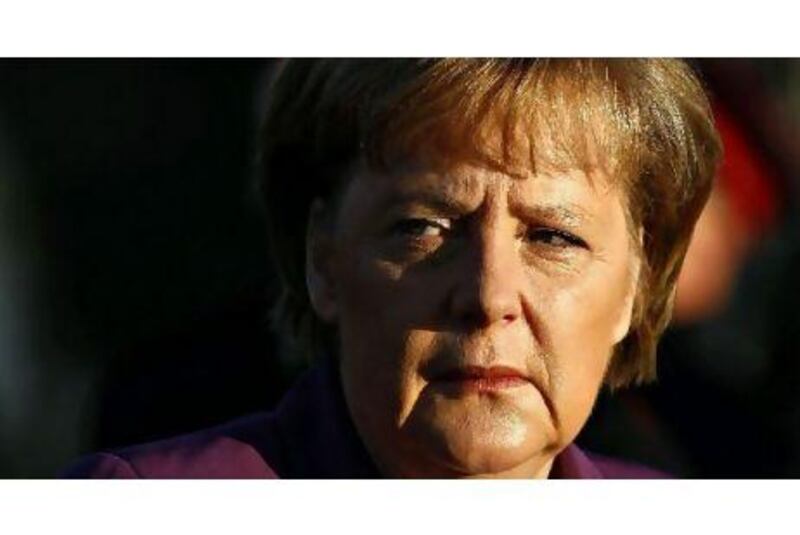The German chancellor faces a general election in 2013 and regional votes ahead of that, so she is playing to a public that believes she has been soft with spendthrift euro nations
Hopes that Angela Merkel, Germany's "Iron Chancellor", will soften her stance on the euro this year are almost certain to be dashed because she will be preoccupied with shoring up her political standing at home. After all, most voters believe she isn't being tough enough.
Support for Mrs Merkel's centre-right coalition has fallen so sharply over the past year that she would no longer command a majority if a general election were held now, opinion polls show.
Luckily for her, she doesn't face one until 2013, but she must start winning back voters this year in a string of seven important regional elections that will effectively lock her government into campaigning mode and put meaningful EU reform on hold, until the end of September at the earliest.
She would be committing political suicide if she signed up to any EU measures this year that could be construed as increasing the burden of the debt crisis on German taxpayers.
This spells bad news for the troubled single currency. It effectively rules out that Mrs Merkel will agree to the closer fiscal integration that is essential to overcoming the basic design flaw of the euro - the lack of a pan-European fiscal policy.
Mrs Merkel has dismissed the idea of issuing common European bonds even though such a move is probably the only way to stop speculative attacks on the markets of ailing member states such as Portugal, which is widely believed to be the next high-debt country that will be forced to seek an EU bailout.
Mrs Merkel has argued that euro bonds would raise German borrowing costs, which are the lowest in the EU, and would allow countries to go on living above their means with her hard-working taxpayers footing the bill.
She has ignored valid arguments that euro bonds could work if limits were placed on their volume, and that a large, liquid euro-bond market almost as big as the US Treasury market could end up reducing borrowing costs for all, including Germany. Mrs Merkel, criticised around the continent for putting German national interests above Europe's common destiny, is under fire at home for having been too soft in signing up to the bailouts of Greece and Ireland and committing her country to the €750 billion (Dh3.61 trillion) EU and IMF rescue fund agreed on last May. Germany, on account of its size, has provided the largest single contribution to the bailouts and to the fund.
The most important of this year's regional elections, in the large, rich south-western state of Baden-Wurttemberg on March 27, could deal her a stinging blow if it doesn't go her way. The state, home to top companies including Daimler, is a bastion of her conservative Christian Democratic Union (CDU) party and has had CDU governors ever since 1953, but opinion polls suggest it could be lost to a centre-left alliance of Greens and Social Democrats.
Her party is widely expected to lose power in the northern city state of Hamburg and also faces difficult elections in the states of Rhineland-Palatinate, Saxony-Anhalt, Mecklenburg Western-Pomerania, Bremen and Berlin this year. The votes will determine the makeup of the upper house of parliament and could make it more difficult for her to get policy through the legislature.
Support for Mrs Merkel's centre-right coalition of conservatives and pro-business Free Democrats has slumped during the past year, largely because of her decision to extend the lifetimes of nuclear power stations and her handling of the debt crisis.
The slide in support is all the more alarming for Mrs Merkel because it coincides with the country's biggest economic boom since 1990, which has been fuelled by exports of cars and industrial goods to fast-growing emerging economies, especially China's.
Germans are brimming with confidence and are hailing their economy as a model for the rest of Europe. Most see the debt crisis as a symptom of reckless extravagance by the countries affected and regard themselves as victims of the single currency.
No one, including Mrs Merkel, has adequately explained to Germans that they owe much of their economic success to the currency stability and low interest rates the euro has provided since its creation in 1999.
Mrs Merkel knows she is more likely to win votes by railing against high-deficit nations rather than by trying to convince them that Germany is the biggest beneficiary of the euro, and stands to lose most if it collapses.





